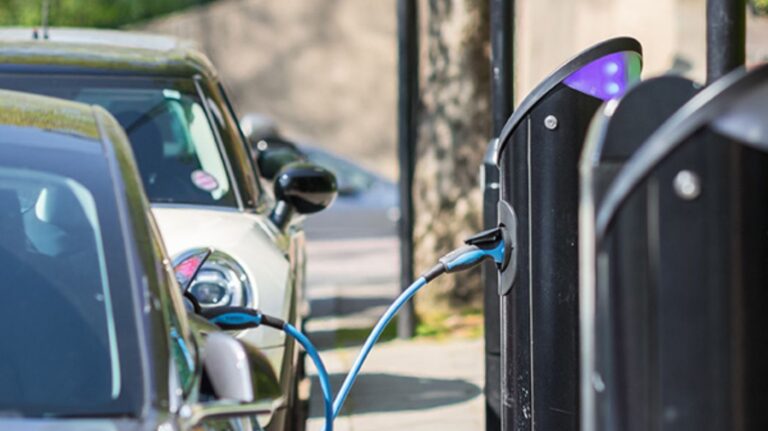An Executive Summary of Report TOL-24-002
Shannon Minehan and Henry Johnston
Aurora Insights
research@aurorainsights.co.uk
Introduction
In the face of environmental degradation, the depletion of fossil fuels, and the impending climate crisis, the transition towards alternative fuel sources has never been more pivotal. Electric vehicles (EVs) are one method with which society can lessen its carbon footprint.
Implementation, however, can have negative fiscal consequences for government revenue. The uptake of EVs can nullify some road user charging (RUC) systems.
This means, as more and more citizens purchase and use EVs, tax revenue generated from these RUCs will deplete, massively cutting government budgets. Our paper assesses these impacts and helps to understand how countries are adjusting to falling tax revenues resulting from increased EV uptake.
Electric Vehicles
Sales of EVs have been increasing exponentially since the 2010s, motivated by rising sustainability concerns, oil crises, and general expense. In 2023, the International Energy Agency (IEA) reported that global sales had exceeded 10 million in 2022, a 5% increase from 2021 (IEA, 2023). Further, the IEA predicted by December 2023, EVs would make up just under a fifth of all cars on the road.
There are several advantages and disadvantages of using EVs. Advantages include that they produce zero emissions which leads to less pollution and greater health outcomes. Further, they have lower operating and maintenance costs than traditional petrol-powered cars, can conveniently be charged at home, are quieter, can outperform ICEVs, and that there are a wide range of incentive programmes and tax breaks that improve their financial viability (Thornton, 2023; Peugeot, n.d.).
Disadvantages include that EVs have a limited driving range, have poor charging infrastructure, long charging times, uncertainty regarding battery size and capability, and can be more expensive to purchase (Thornton, 2023; Volkswagen, n.d.; Moorhouse and Laufenberg, 2010). EVs can also have negative environmental consequences if they are charged using high emission methods (Barkenbus, 2017), and can exacerbate human rights violations because of the materials needed to manufacture them (Ambrose and O’Dea, 2017; Amnesty International, 2016; World Economic Forum, 2021).
Implications for Road User Charging
With the observed and further anticipated increase in EVs underway, implications for road user charging (RUC) have been realised. Many of the existing RUC systems do not apply to EVs which can have negative effects on the revenue generated and exacerbate inequality.
For example, EV users are exempt from fuel taxes. EV drivers do not use fuel, meaning they do not contribute to the tax revenue generated from this fee. This has significant ramifications in that, as EV uptake rises, the amount of tax revenue generated through this channel will fall unless the tax is raised. Further, as many countries allocate fuel tax funds to the maintenance and development of roads, EV drivers reap the benefits of this tax without having to contribute to it. Ultimately, this means the burden of tax is disproportionately placed upon lower socioeconomic status groups (Tovar Reaños and Sommerfeld, 2018).
Registration taxes are another example of a less efficient method of taxing EVs. In many countries, registration fees are based on the level of emissions a vehicle produces. Many EVs are zero-emission, meaning they pay a significantly lower registration tax if they pay one at all. This again exacerbates inequality as lower socioeconomic groups who are unable to pay the high upfront cost of an EV are penalised for having higher emission vehicles (Hardman et al., 2021).
Country Analysis
To address failing RUC schemes, countries around the world are investigating new systems. In Australia, a distance-based fee was trialled in the state of Victoria. However, jurisdictional issues led to the High Court determining an RUC on EVs must be administered nationwide. Denmark is also looking to distance-based RUC, with fees determined by distance travelled and emissions, as are Switzerland and the United States of America. New Zealand is looking to registration taxes. Presently, EVs are exempt from registration fees, however this exemption is set to be lifted as at April 2024. In Japan, to accommodate limitations on charging infrastructure, electric road systems are being investigated.
Novel Data Analysis
Noting these trends, we conducted complementary analysis of a novel dataset manually constructed from the 2023 Road User Charging Conference series.
We found the most common challenges encountered alongside a rise in EV uptake were:
- Environmental concerns, reported by approximately 88% of the sample;
- Falling revenue, reported by just under 80% of the sample;
- Inequality, reported by a quarter of the sample, and;
- Concerns regarding fuel efficiency, reported by a quarter of the sample.
The most recurring solution to these challenges was the implementation of a new RUC system, or investigation into new RUC regulations. This was the solution for 92% of the sample. The most common RUC identified to address the aforementioned concerns was a distance-based fee with approximately 80% of the sample investigating or implementing a distance scheme.
Following implementation of these solutions, the most common benefits reported within our sample were improved equality and improved environmental impacts, each reported by approximately 17% of the sample. An eighth of the sample reported improvements in revenue collected.
Conclusion
In conclusion, we find that as the uptake of electric vehicles continues to rise, governments will need to adjust their existing road user charging schemes to ensure tax revenue, equality, and environmental goals are met.
This executive summary is an excerpt from bespoke research service provider Aurora Insights’ report, ‘Highway Robbery: Insights into the effect of electric vehicles on road user charging’. To purchase the full 60+ page report and others covering topics including the supply chain and logistics, robotics and automation and road user charging, visit www.aurorainsights.co.uk.





